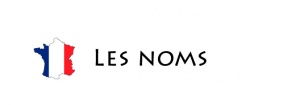Difference between revisions of "Language/French/Grammar/Nouns"
| (7 intermediate revisions by the same user not shown) | |||
| Line 1: | Line 1: | ||
[[File:les-noms-en-francais.jpg|300px]] | |||
A noun is a word representing a person, a place or a thing. In French, all nouns have a gender masculine or feminine. | |||
In this lesson, we will explain how to form the masculine, feminine and plural of nouns. | |||
{| class="wikitable" | {| class="wikitable" | ||
| Line 67: | Line 75: | ||
{| class="wikitable" | {| class="wikitable" | ||
! | | |||
Singular | Singular | ||
! | | |||
Plural | Plural | ||
| Line 124: | Line 132: | ||
===Examples=== | ===Examples=== | ||
{| class="wikitable" | |||
!| | |||
Singular | |||
! | | |||
Plural | |||
|- | |||
| | |||
le château (castle) | |||
| | |||
les châteaux (castles) | |||
|- | |||
| | |||
le cheval (horse) | |||
| | |||
les chevaux (horses) | |||
|- | |||
| | |||
le bus (the bus) | |||
| | |||
les bus (buses) | |||
|- | |||
| | |||
le nez (nose) | |||
| | |||
les nez (noses) | |||
|- | |||
| | |||
| | |||
les gens (people) | |||
|} | |||
{{#seo: | |||
|title=How to use the punctuation in French? | |||
|keywords=grammar, feminine, masculine, plural, examples | |||
|description=This lesson will teach you how to use nouns in French sentenses | |||
|og:image=https://polyglotclub.com/wiki/images/2/2f/Les-noms-en-francais.jpg | |||
}} | |||
[[Category: French/Beginner]] | |||
[[Category: French/Grammar]] | |||
Revision as of 10:58, 15 June 2017
A noun is a word representing a person, a place or a thing. In French, all nouns have a gender masculine or feminine.
In this lesson, we will explain how to form the masculine, feminine and plural of nouns.
|
Masculine |
Feminine |
|---|---|
|
un ami (a friend) |
une amie (a friend) |
|
un acteur (an actor) |
une actrice (an actress) |
|
un musicien (a musician) |
une musicienne (a musician) |
|
un boulanger (a baker) |
une boulangère (a baker) |
|
le détective (the detective) |
la détective (the detective) |
|
le professeur (the professor) |
la professeur (the professor) |
In French the masculine and feminine nouns differ. different articles and adjectives are also used.
Countries ending in "-e" are feminine (except "le Mexique") : - le Portugal, le Brésil... - la France, l'Espagne, l'Argentine...
The feminine is generally formed by adding -e to the male, and in some cases other letters or accents are added.
Sometimes, there are different nouns for male and female forms. Some professions are used only in men :
Examples
|
Singular |
Plural |
|---|---|
|
le château (castle) |
les châteaux (castles) |
|
le cheval (horse) |
les chevaux (horses) |
|
le bus (the bus) |
les bus (buses) |
|
le nez (nose) |
les nez (noses) |
|
les gens (people) |
Noun singular and plural
un livre (a book) des livres (books)
The plural is generally formed by adding -s to the singular.
Some nouns have special plural, according to the termination: -eau becomes -eaux -al becomes -aux -s remains the same -s -z remains the same -z
Some nouns have no singular form
Examples
|
Singular |
Plural |
|---|---|
|
le château (castle) |
les châteaux (castles) |
|
le cheval (horse) |
les chevaux (horses) |
|
le bus (the bus) |
les bus (buses) |
|
le nez (nose) |
les nez (noses) |
|
les gens (people) |
